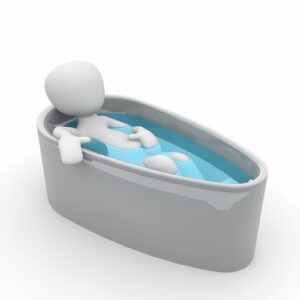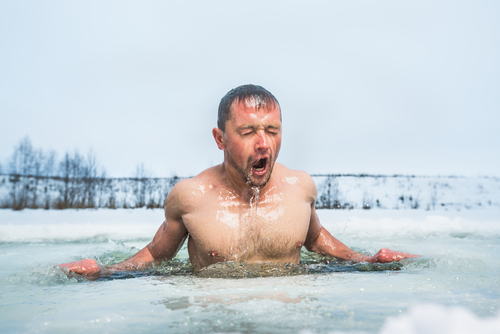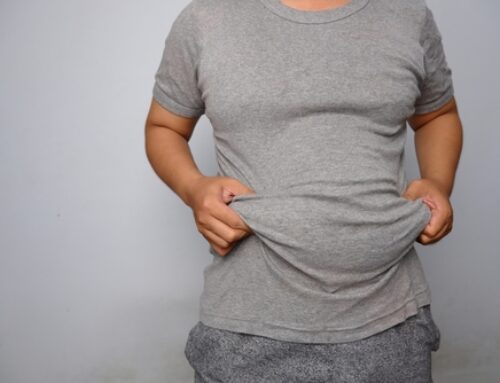The Health Benefits of Cold Plunges
Daryl C. Rich, D.C., C.S.C.S.
[Core] Chiropractic and Wellness
CoreRoanoke.com
 Cold plunge baths, also known as cold water immersion or cryotherapy, have been used for centuries as a natural remedy for various health conditions. In recent years, there has been an increasing interest in the benefits of cold plunge baths, particularly among athletes and fitness enthusiasts. In this article, we will explore the potential benefits of cold plunge baths and the scientific evidence supporting their use.
Cold plunge baths, also known as cold water immersion or cryotherapy, have been used for centuries as a natural remedy for various health conditions. In recent years, there has been an increasing interest in the benefits of cold plunge baths, particularly among athletes and fitness enthusiasts. In this article, we will explore the potential benefits of cold plunge baths and the scientific evidence supporting their use.
Reduces Inflammation
One of the primary benefits of cold plunge baths is their ability to reduce inflammation and muscle soreness. Cold water immersion causes vasoconstriction, which reduces blood flow to the muscles and tissues. This decreased blood flow reduces inflammation and swelling, which in turn reduces muscle soreness and speeds up recovery. Several studies have found that cold water immersion can reduce post-exercise soreness and improve recovery time in athletes.
Cardiovascular Health
Cold plunge baths may also have cardiovascular benefits. Exposure to cold water causes the blood vessels to constrict, which increases blood pressure and heart rate. This can improve circulation and help to stimulate the immune system. A study published in the International Journal of Sports Medicine in 2017 found that cold water immersion can improve heart rate variability, a measure of cardiovascular health.
Improved Mental Health
Another potential benefit of cold plunge baths is their ability to boost mood and energy levels. Exposure to cold water releases endorphins, which are natural painkillers and mood boosters. In addition, cold water immersion may increase levels of noradrenaline, a hormone that can increase energy levels and improve focus. Some people report feeling a “rush” of energy and mental clarity after taking a cold plunge bath.
Some Should Avoid Cold Plunges
Despite these potential benefits, it is important to note that cold plunge baths are not without risks. Exposure to cold water can cause hypothermia, particularly if the body is not acclimated to the cold. In addition, people with certain medical conditions, such as heart disease or Raynaud’s disease, may be at increased risk for complications from cold water immersion.
Improves Mitochondrial Activity
There is evidence that cold therapy improves mitochondrial health through a process known as “mitochondrial biogenesis,” or in other words, by producing more of them. Mitochondria are tiny double membrane-bound organelles found in almost every cell of all organisms except bacteria. Known as the “powerhouse of the cell” they are primarily responsible for converting the air we breathe and the food we eat into energy that our cells can use to grow, divide and function.
I find cold therapy compelling because it forces me to become comfortable with discomfort. It is as much a mental training as a physiological one. The ability to willingly place yourself into an uncomfortable situation and remain there for as long as you are able to endure it, trains your body for hard exercise, to endure difficult work, thrive in stressful situations, and to be patient when needed.
Stimulates Your Vagus Nerve
Can cold water really stimulate your vagus nerve? Yes, indeed. While your body adjusts to the cold, sympathetic activity declines, while parasympathetic activity increases. Stimulation of the vagus nerve will cause an increase in deep breathing while lowering your heart rate. This has an effect of reducing stress and increasing your oxygen levels to the brain.
How Cold Is A Cold Plunge?
What temperature does the water need to be in order to see the benefits of a cold plunge? Most studies referenced a cold plunge in water temperatures of 50º-52ºF from anywhere for 30 seconds to several minutes.
How To Do A Cold Plunge At Home
While there are convenient cryotherapy centers that provide the benefits associated with ice baths or a cold plunge in a rapid fashion, they can be expensive. Can you do your cryotherapy at home and save some money, yes of course! Try throwing a ten-pound bag of ice in your bathtub as a post-workout recovery. You may find that starting with cold water only and adding the ice into the bath after you have soaked for a few minutes is easier to handle. The cold water immersion of an ice bath or cold plunge is the most effective form of cryotherapy.
What If You Can’t Handle A Cold Plunge?
Set yourself up for success by starting slowly and at a temperature that eases you towards your goals. For example: try ending your hot shower with 15 seconds of cold water. After a few days increase your time to 30 seconds, at a slightly colder temperature. Stick with the process and you’ll be surprised at both the temperature and duration you can withstand in a short period of time. Even 30-90 seconds of cold water can have profound health effects. Some studies have shown that ending a hot shower with 30-90 seconds of cold water resulted in a 29% reduction in sickness.
Why start with hot water and end with cold? The goal behind switching between hot and cold water is to create contrast, because senses and receptors are designed to detect and respond to change. Cold acutely causes constriction, shunting blood flow from the periphery to internal organs to conserve heat but the response after it is stopped improves circulation. The result is increased alertness, decreased tension and inflammation, and increased expression of mitochondrial biogenesis. Ending with hot water would in theory do the opposite.
In conclusion, cold plunge baths have the potential to offer a range of health benefits, from reducing inflammation and muscle soreness to improving cardiovascular health and boosting mood and energy levels. However, it is important to approach cold water immersion with caution and to consult a healthcare provider before trying it, particularly if you have any underlying health conditions. With proper precautions, cold plunge baths can be a safe and effective way to support overall health and wellness.









